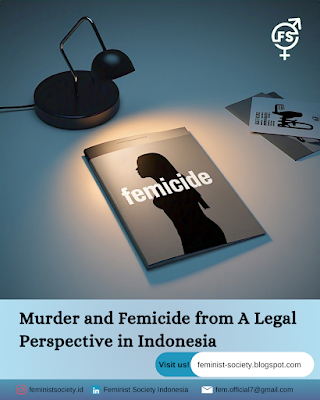Emanuella Malonda
 |
| Murder and Femicide in Indonesia |
Feminist Society Indonesia — Nowadays, there has been a lot of news about murder cases that have attracted public attention; interestingly, most of the victims of these murder cases are women. This is certainly closely related to the study of femicide. Therefore, it is necessary to have a basic explanation regarding murder and femicide.
Murder can literally be interpreted
as a process, method, or act of killing so as to take the life of another
person. Meanwhile, murder, according to Wirjono Prodjodikoro, is an act or deed
carried out by a person against another person so that in his actions it can
cause the loss of someone's life. In the rules in Indonesia, murder is directly
interpreted in Article 338 of the Criminal Code, which reads: "Anyone who
intentionally takes the life of another person is guilty of murder".
Hence, it can be concluded that murder is an act by a person that results in that
person being killed or dying.
Meanwhile, the meaning of femicide
has not been clearly regulated in Indonesian laws and regulations, however, femicide
is not a new discourse in global dynamics. The National Commission on Violence
Against Women (Komnas Perempuan) states that femicide is the deliberate murder
of women because of their sex or gender, which is driven by superiority,
dominance, hegemony, aggression, or misogyny towards women; a sense of
ownership of women, inequality of power relations, and sadistic satisfaction.
Femicide is often categorized as an unusual murder because there are many
things behind the murder so that it is categorized as femicide.
There is a
difference between murder and femicide even though the end of the act causes
death or loss of life. When viewed from its content, femicide is different from
murder because it contains aspects of gender inequality, domination, aggression
or oppression. Femicide is not death as is generally the case but rather a
product of patriarchal and misogynistic culture and occurs both in the private,
community and state spheres. Based on these aspects, a new classification
was created in the realm of Murder, namely, Femicide.
You can also read: Femicide Has Been Increasing in Indonesia, How Can We Deal With It?
When viewed based on its type,
Femicide has 9 types of Femicide, namely: (1) Intimate Femicide, (2) Cultural
Femicide (in the name of honor, related to dowry, related to race, ethnicity,
related to accusations of witchcraft, related to injury and cutting of female
genitalia, Femicide of babies: abortion, infants and toddlers), (3) Femicide in
the context of armed conflict, (4) Femicide in the context of the commercial sex
industry, (5) Femicide of women with disabilities, (6) Femicide of Sexual Orientation
and Gender Identity, (7) Femicide in Prison, (8) Non-Intimate Femicide
(Systematic Murder), and (9) Femicide of Human Rights Activists/Humanitarian
Activists.
Indeed, Indonesia has basically
issued a regulation, namely Law Number 7 of 1984 concerning the Ratification of
the Convention on the Elimination of All Forms of Discrimination Against Women (CEDAW),
but in reality, there has not been found a specific regulation (lex specialist)
that implements the spirit and mandate of CEDAW.
This shows the government's lack of
seriousness in protecting and maintaining the dignity of a woman from the grip
of superiority, domination, hegemony, aggression and misogyny. Therefore, the Indonesian government needs to immediately
issue regulations that specifically regulate femicide in order to protect and
free women from all forms of oppression.
If you are interested in issues
related to gender equality and in-depth discussions about feminism, join with
Feminist Society Indonesia. Feminist Society Indonesia aims to promote gender
equality and women’s rights activism through education and advocacy. To get
related articles, please visit the page feminist-society.blogspot.com.
You can also contact us on:
Instagram :
@feministsociety.id
LinkedIn : Feminist Society Indonesia
Email : fem.official7@gmail.com
View More:
https://unric.org/en/behind-closed-doors-the-deadly-reality-of-femicide/
https://www.unwomen.org/en/articles/explainer/five-essential-facts-to-know-about-femicide



